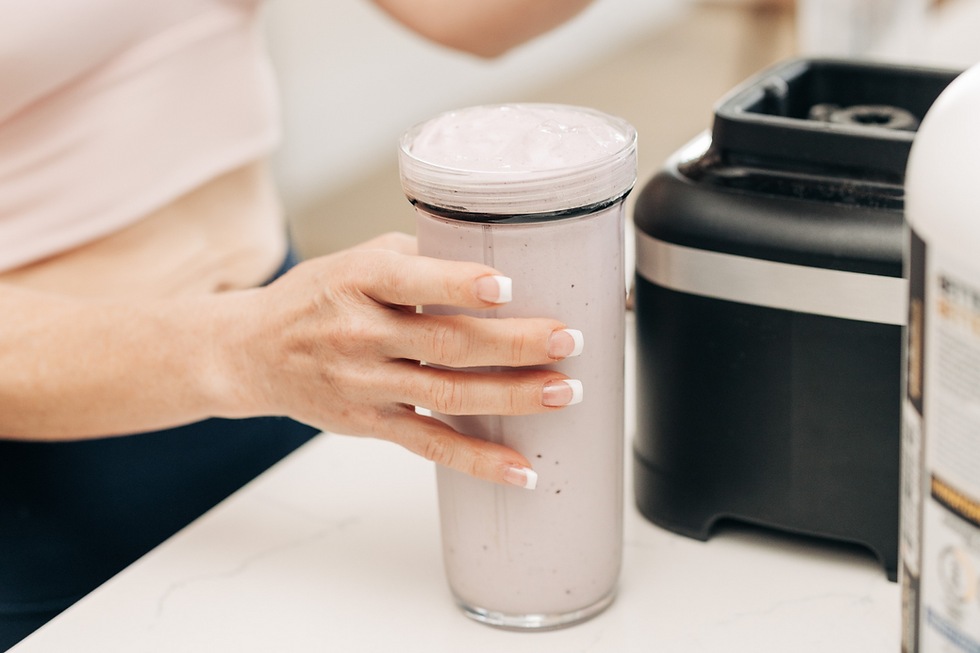7 Nutrients That Fight Fatigue
- Brandi Smith
- Nov 30, 2022
- 3 min read
Are you feeling sluggish? Changing what you put into your body may help the energy you're able to put into your day.

Medical conditions, stress, physical exertion and lifestyle factors all play a role in persistent exhaustion. While turning to processed foods and energy drinks may provide a temporary boost in energy levels, a crash often follows. Instead, a well-balanced diet can provide steady energy throughout the day.
Here's how:
1. Protein
Eating protein rich foods such as lean meat, fish, eggs, beans, legumes, tofu, dairy or dairy alternatives and yogurt will help you keep energy high all day long. Don't skip breakfast either. A daily breakfast, especially one rich in protein, provides sustained energy throughout the day for most people. However, some of us require protein at different times of day depending on our unique body (reach out to do my 4-day energy experiment to determine what your optimal protein consumption time of day is!)
2. Magnesium
Magnesium can improve your sleep quality and help you feel more energized and rested. Low magnesium levels can deplete your energy levels. Leafy green vegetables, beans, nuts, legumes and whole grains are all high and excellent sources of magnesium.
3. Complex Carbohydrates
Our bodies get energy from mainly from carbohydrates. A mix of complex carbohydrates, protein and healthy fats (I call it the 'magic plate'), provides long lasting energy throughout the day. Complex carbohydrates supply nutrients and fibre that control blood sugar levels and provide a sense of satiety, which will sustain your energy levels. Including complex carbs in your meals will help you avoid a spike or dip in energy levels between meals and throughout the day. Sweet potatoes, brown rice and quinoa are excellent sources of complex carbs. Avoid processed carbs such as white bread, white rice, sweets, added sugars and pastries, which will cause that blood sugar crash and delete your energy and fast!
4. B vitamins
Vitamin B12 is crucial for making red blood cells, which deliver oxygen to all parts of our bodies. If you have a deficiency, it can cause you to feel fatigue and weakness. Meat, poultry, fish and dairy products are good sources of B12 and by incorporating a variety of foods into your diet you will get the full spectrum of B vitamins.
5. Iron
Iron delivers blood to nourish all the cells and tissues in our bodies. Low levels could result in brain fog, dizziness and weakness. Seafood, spinach, kidney beans, chickpeas, tofu, lentils and meat are excellent sources of iron. Pair foods rich in vitamin C and iron-rich foods at the same meal to enhance iron absorption. For example, lentils and red bell peppers, healthy greens and lemon juice; or oatmeal with blueberries.
6. CoQ10
Coenzyme Q10 (CoQ10) is an antioxidant that aids in generating energy in the cells. Our bodies naturally produce CoQ10, which is abundant in the heart, kidneys, liver and pancreas. However, the production of CoQ10 decreases as you age. organ meats, oily fish and whole grains are among the primary CoQ10 dietary sources. There are studies that suggest that CoQ10 supplements can help fight certain heart disorders, diabetes and Parkinson's disease, and reduce blood pressure.
7. Potassium
Potassium is one of the critical macro minerals, which are required minerals in relatively large quantities in our bodies. It's responsible for a variety of functions, including energy production. A deficiency in potassium may cause weakness, fatigue, muscle aches and cramps. Good nutrition, hydration, sleep and exercise are beneficial for sustained energy. If you looking for help to get on track and attain that energy boost, reach out for a complimentary breakthrough session with me today.




Comments